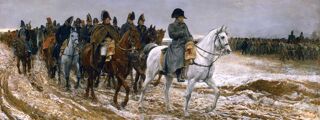In June 1812, one of the greatest military commanders of all time launched his most daring and risky invasion.
Napoleon Bonaparte is considered a brilliant military leader but the invasion of Russia would prove to be a significant turning point in both his and Europe’s futures. The campaign may be over two hundred years in the past, but the failure of the invasion can give us some insight when dealing with our current threats and conducting future military operations.
The reasons for Napoleons invasion of Russia has long been debated by historians. Many feel that its purpose sits on weak foundations, with some drawing conclusions that France was eager to continue its economic blockade of Britain, seeking to force Russia into complying with the ‘Continental System’. Whatever the reasons, it is fair to argue that the force created by the Emperor was far greater than anything that Europe had seen up to this point. The Grande Armée of some 650,000 troops was truly a European army, comprising mixtures of language and culture, making it difficult to utilise effective methods of command and control. Unlike modern armies, decisions were made by Napoleon himself and little was designated to other officers. His units were large in number but lacked combat experience, with the best French troops deployed in other areas of conflict around the continent.
As with other failed military offensives, there are always discussions as to whether they were doomed before they even began. The author himself has argued in a previous piece that the German invasion of the Soviet Union in 1941, was logistically incapable of success before troops even entered the motherland. It is true that similar claims will be made here but they were the result of the failings of the commander himself. Napoleon believed, and as was custom in 17th century combat, defeated Russian generals would surrender after battles, seeking an immediate peace treaty. The difference in this invasion, was that Tsar Alexander 1st, whose forces did loose several key battles during the campaign, denied the French this surrender and instead withdraw further into Russia’s vast territory. In a desperate attempt to seek this glory, the Grande Armée marched deeper and deeper into enemy territory, sustaining terrible and irreplaceable losses at the battle of Borodino in September 1812.
The ‘miracle’ of Borodino has been captured by subsequent Russian governments as a defining moment in the invasion. It is in fact true that the Russian army did sustain much greater losses, but those could be replaced. The battle severely reduced the French capacity to fight, with a third of the Armée killed or wounded. The outcome of the battle, repeated that of the previous engagements with Russian soldiers withdrawing in good order. They subsequently abandoned Moscow, leaving the gates open to the exhausted French troops. This moment is likely the second great miscalculation of Napoleon within the campaign, as his continued desire to expect a peace settlement, saw him billet his troops for month in the city. With little food for men or horses and much of Moscow in ruins, after a large fire, the commander had little in the way of options.
Realising that negotiations would never arrive, he decided to begin what would become the infamous retreat back to Poland, trampling over ground that his soldiers had marched on only months before. Harried by Russian troops and struggling to gather food, thousands died of starvation and exhaustion. Towards the end of the struggle the winter set in, seeing yet many more troop succumbing to the snows. Of the 650,000 that began in the June 1812, fewer than 100,000 would manage to stumble back to France. The invasion has come to symbolise the identity of Russian society, helped significantly by Leon Tolstoy, who in his great novel, War and Peace, sort to show the victory as the ‘peoples’ triumph.
The parallels of this failed military operation may seem insignificant when compared with the more pressing issue regarding global health. However, history is nothing if not a teacher. We may as nations have to except that future military campaigns will not end with one significant victory. As with Napoleon, desires to see a ceasing of hostilities or attempt to predict a return to normality may make situations much worse. The battle against future threats will not be short but instead, sustained and costly conflicts which as we have seen will incur civilian casualties. It is us as a global community to be honest about the implications that the dealing with future threats will have on all our lives.
The invasion of 1812 has come to symbolise what happens when a nation extends a conflict outside its abilities to wage war. If we learn from the mistakes of the past, we can at least attempt to alter future historian’s interpretations of the campaign against current and upcoming threats.





